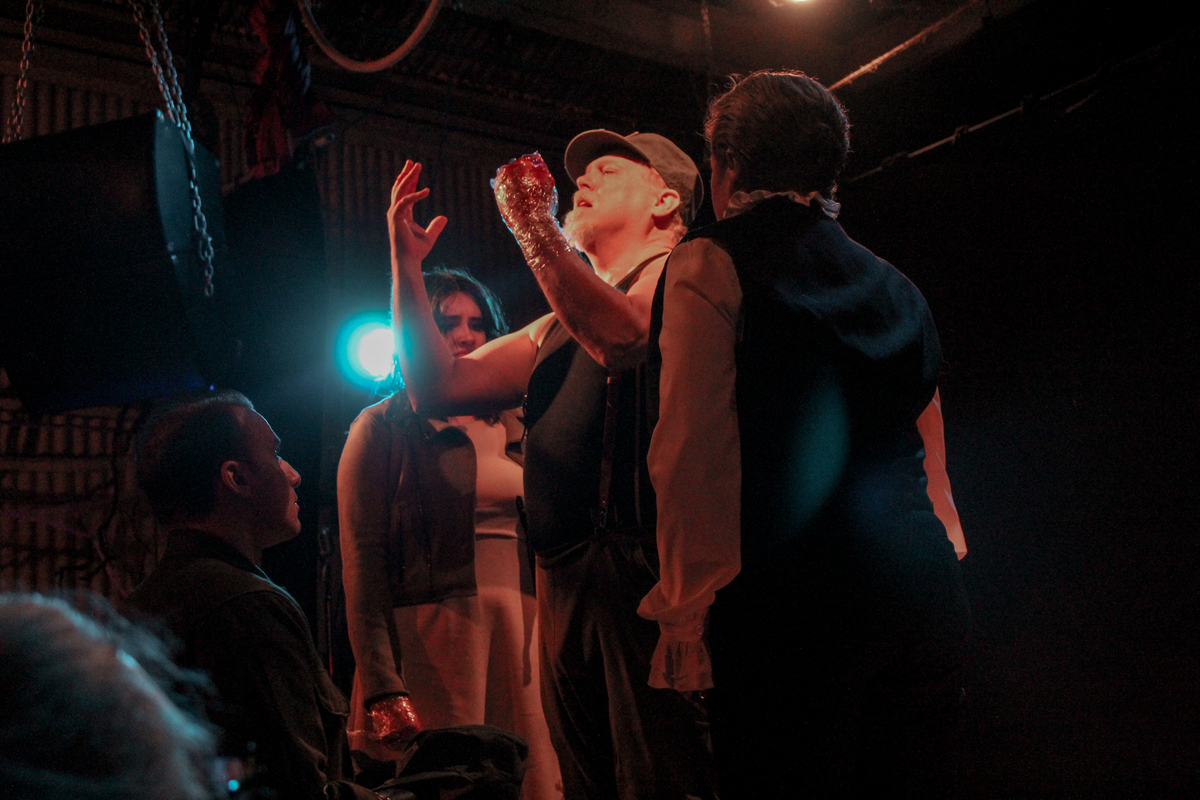Is violence our human nature? Are hurt people destined to hurt people? Is it possible to break the cycle of trauma? These are the questions that Shakespeare asks us to ponder in his revenge tragedy Titus Andronicus, showing in Portland for the first time in 25 years.
Speculative Drama presents the performance and aims to make Shakespeare more inclusive and reclaim these stories. “I think people have preconceptions about a lot of the roles,” said Myrrh Larsen, the director. “They are like, this is what a villain looks like. This is what romantic leads should look like—and getting to see different bodies and different races and different gender presentations and just different iterations of those, I think, takes you out of that place where you’re like, I know what I’m seeing, and into this place where you get to really experience what’s happening in the story in real-time.”
The language of Shakespeare can feel inaccessible in many modern Shakespeare productions, even ones that claim to modernize the verse. This production, however, addresses the accessibility issue differently. Instead of modernizing the verse and scansions, they work to improve the actor’s embodiment of the characters.
“I’m pretty anti-Shakespeare voice,” said Megan Hale, who is movement director and plays Tamora, Queen of the Goths. “I feel like we connect to the characters, and the actors connect to the characters a lot stronger when they say those words like they’re actually words they would say. I feel like there’s no such thing as modernizing or not modernizing the verse itself. You’re either the person who actually says those words, or you’re acting, and you’re not actually living in the character.”
I have found myself straining to understand the words and story in the past Shakespeare I have seen performed, but this was less so in this performance. While I still believe Shakespeare is best enjoyed with active engagement, I felt connected to the characters and the words they happened to be saying profoundly in this Titus Andronicus.
The emotional turmoil—I felt it instead of hearing it. The tone was cutting, fear-inducing and violent in all ways you want a show such as this to be. While the characters’ urges were extreme and unrelatable for the average person, the emotion and the pain were deep.
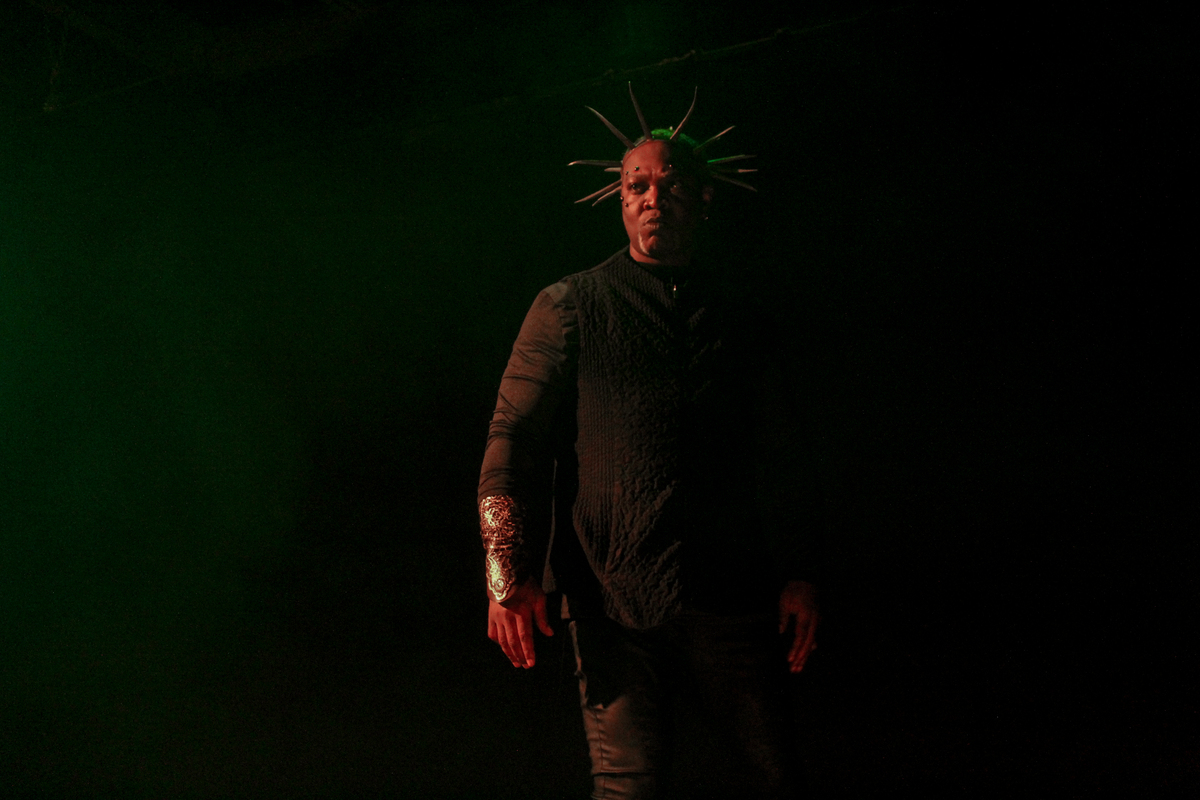
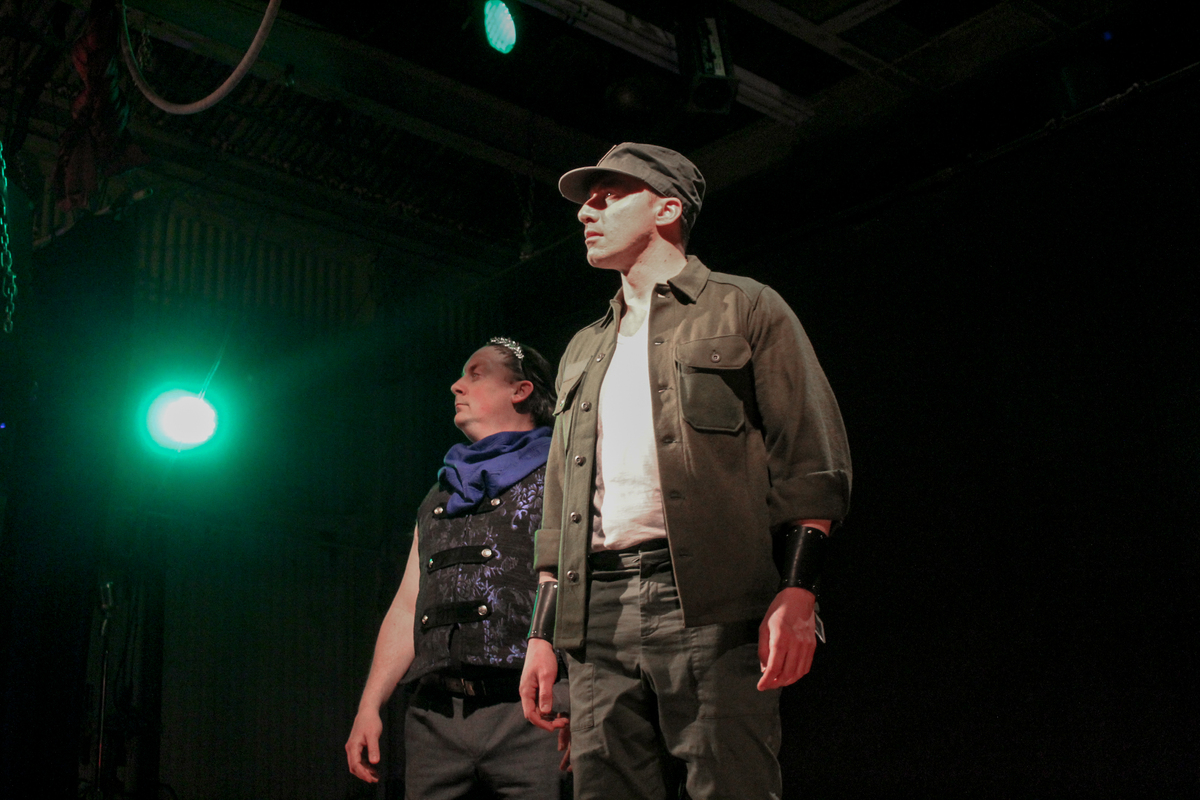
In this corner of reality, their responses seemed like logical responses. The experience and feeling towards the characters were best summarized by Larsen when they said, “I don’t like you, but I still have love and have empathy for you. Oh, you must be so wounded to have gotten to this point.”
The show’s most complicated character to empathize with was Aaron, who seemingly is a perfect example of violence as human nature. Eric Island, the actor, spoke about how challenging it was to play this character. “My natural disposition is I’m a very caring and loving person,” he said. “So I’m very empathetic towards those types of things. I would say if that’s a challenge, it would be to be that coldhearted and not be phased.”
Island did embody the character’s nature well despite it being against the actor’s personality, and like most Shakespeare characters, Aaron is not all darkness—in one scene, he is portrayed as a violent, bloodthirsty character, and in the next he is a father defending his son.
“I think it’s always that tug-of-war of good versus evil,” Island said. “Every individual within our person has to deal with that angst of self-preservation versus this is my family—I’m doing this for them. In perspective, if you’re not in the family, it could seem very heartless. If you’re in the family and you’re trying to survive, it seems like the only thing that you can do to push forward. And so then when you step back, and you look at both sides, there’s no good or bad, or right or wrong—it is people trying to survive and move forward.”
Surviving is difficult in the face of immense loss, and leaning into anger often feels like the only way to do that. Tamora, Queen of the Goths, embodies this and, in her pain, feels justified in the pain she unleashes on others. However, in turning away and endorsing others’ violence, she loses herself to her pain, and in her quest and out of love and loss her revenge is realized—but at what cost?
This is a common theme in Shakespeare and arguably inspires modern work. “I think about this show is that its themes resonate with media that’s being put out today,” said Megan Haynes, who plays Chiron. “I played The Last of Us while I was in rehearsal for this, and they have very similar themes of revenge as a vehicle for love. They really have this question of is it really worth it?”
Titus, played by Michael Streeter, explores this question and demonstrates the impact of unbridled grief. Streeter did a phenomenal job embodying this loss and grief. “80-90% of my character throughout the play is talking about his tears and his crying, and his grief,” Streeter said. “If I were playing that… you wouldn’t hear what’s really happening is the poetry of talking about the grief and the tears as opposed to actually seeing the tears.” This character’s pain was so immense that expressing that would have filled too much space.
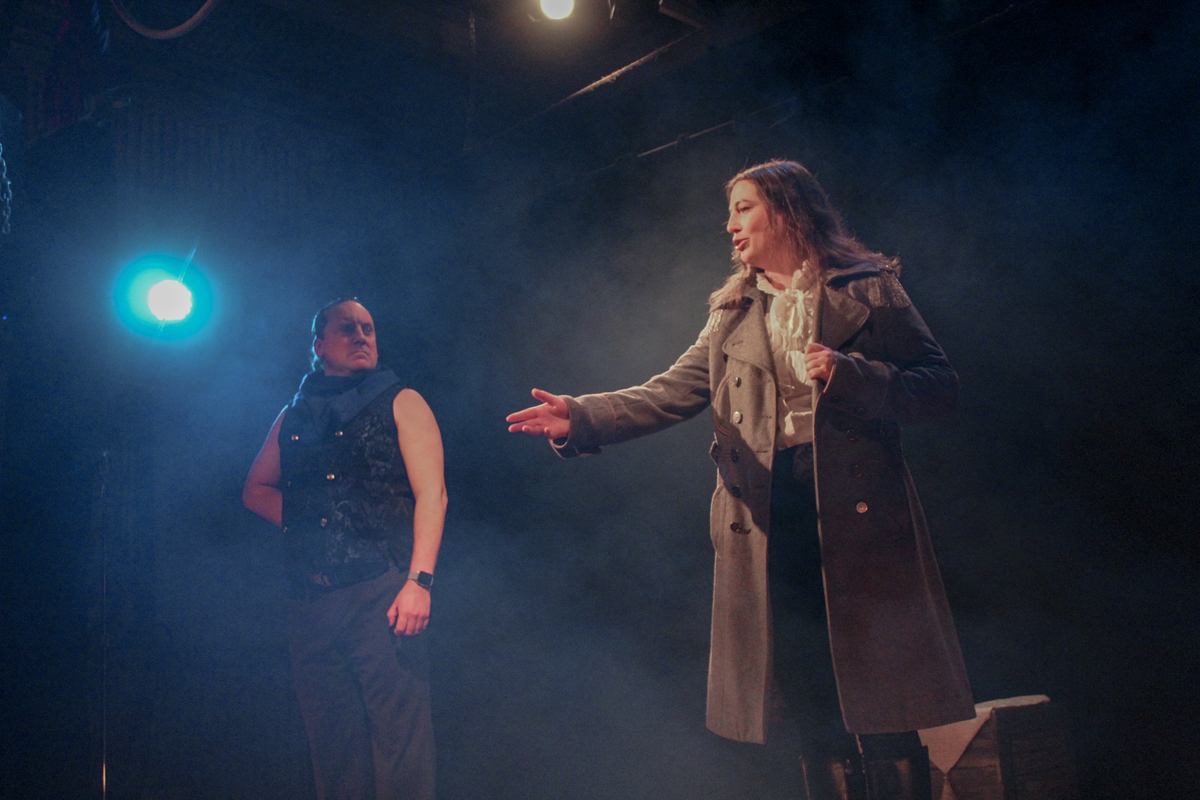
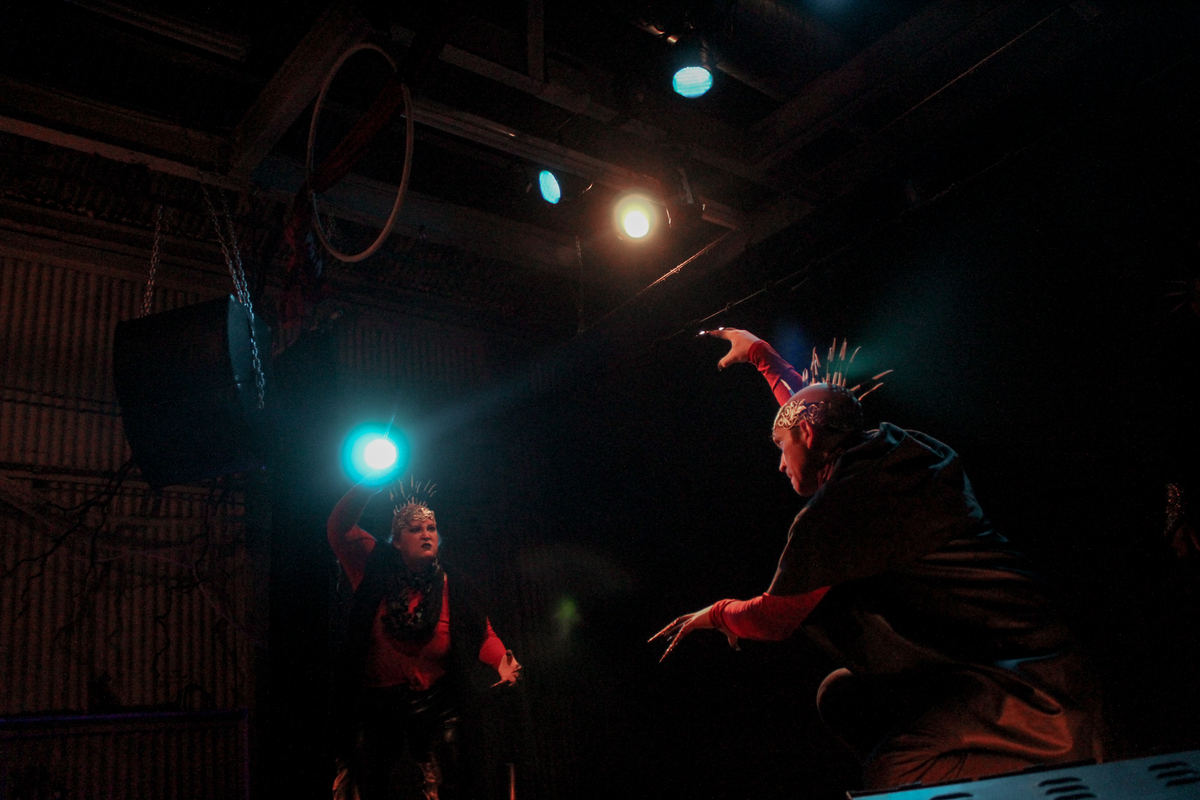
Those around Titus are equally impacted by his grief, as his son Lucius—played by Murren Kennedy—feels the weight of his father’s unheard cries for help and vindication. “My character is, I can interpret it as, the ultimate soldier,” Kennedy said. “Maybe even designed for war as a tool built to serve, lives to serve. I realized when all these horrible things happen for no real reason even, I have a line, “Thy grief, their sports, a resolution mocked.’” This grief and feeling anger at the world moving on in the face of their family’s pain sets the perfect stage for seeking revenge as a resolution to inaction.
Titus’ daughter Lavinia is arguably the most innocent character and the most tragic, because she is a constant reminder of his loss and pain. Despite her own tragedies, which could be considered more numerous than Titus’, he grew to resent her for what she represented. This hatred and viewing as inferior after Lavinia is victimized “also speaks to how we as a society tend to view disabled people,” Haynes said. “Like they’re a burden, an inconvenience to abled people.”
Titus’ final act might make one ponder as Isabella Buckner, who plays Bussianus and other supporting characters, did “about what grief can do to you if you don’t, if you don’t handle it, and if you don’t like, accept it and let it wash over you… If you close yourself off from it.”
In the end, seemingly, that is what he did. Titus closed himself off to his grief and insanity took its place. He got his revenge but was lost long before he sought it. Pain can be insanity-making and rage-inducing, and despite the impulses highlighted by this performance being the worst human responses to these experiences, the emotions are still raw and relatable today. “We all experience love and loss and pain and grief and anger, and I think that these characters that he’s written are just timelessly applicable,” Haynes said.
In addition to live performances, Titus Andronicus is also being shown virtually on Wed. 19. The virtual show includes elements not visible in the live show. “This [virtual show] we’re doing this Clive Barker-like horror theme,” Larsen said. “We’re doing all these like slow, extra dramatic scenes.” Potential viewers should be advised that the show deals with potentially triggering content such as physical violence and sexual assault. Audiences can catch in-person shows in Portland until April 22.

